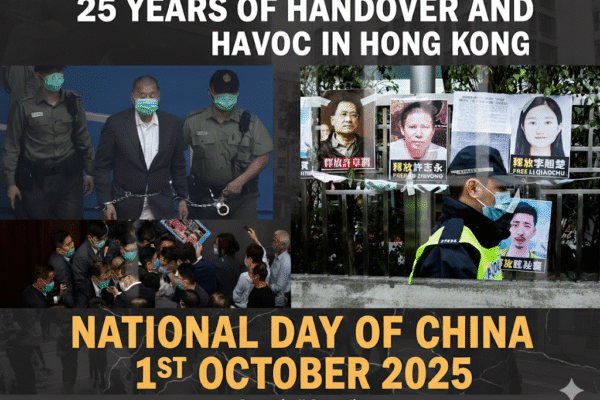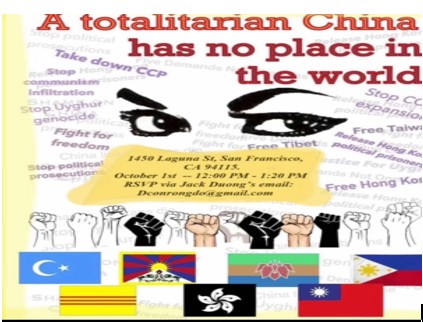
25 years of handover and havoc in Hong Kong
25 years of handover and havoc in Hong Kong have been presented in this investigative report. It shows the timeline of Hong Kong and changes post National Security Law in a comprehensive manner.

25 years of handover and havoc in Hong Kong have been presented in this investigative report. It shows the timeline of Hong Kong and changes post National Security Law in a comprehensive manner.
RFA Perspectives — Deepfake and AI videos are created from tools anyone can download. North Korean hackers are already using the same tools as a weapon. Video: ‘This is fake’ How North Korea is weaponizing AI and deepfake technologyRecently, South Korea’s cybersecurity firm Genians revealed that a North Korean hacking group used AI-generated deepfake military IDs to impersonate defense agencies and launch phishing attacks. Their targets? Officials, journalists, human-rights activists, and researchers. This isn’t new. North Korean IT workers have long used AI and deepfakes to build fake identities—sometimes even stealing U.S. identities to apply for jobs. They appear in video interviews with AI-made faces and voices. Cybersecurity expert Dawid Moczadło, co-founder of Vidoc, shared a video on LinkedIn that experts believe shows these workers in action. At first glance it looks real, but if you watch closely—something feels off. If these workers get hired, they don’t just collect a paycheck. They can plant malware, steal company data, and funnel money back to North Korea’s weapons programs—helping the regime dodge sanctions. AI can make life easier for everyone. But in North Korea’s hands, it becomes a weapon—one that threatens your personal data, private companies, and even national security. For more on North Korea hackers, watch RFA Korean’s three-part series “Whack a Mole”: Part One: Kim Jong Un’s secret soldiers — the hackers Part Two: Cryptocurrency heist Part 3: Are you a North Korean worker? We are : Investigative Journalism Reportika Investigative Reports Daily Reports Interviews Surveys Reportika

Seven years after China’s mass “re-education” drive in East Turkistan, the Uyghur people face detention, forced labour, surveillance, and cultural erasure. On the eve of China’s National Day 2025, this IJ-Reportika report highlights statistics, testimonies, and cultural losses that numbers alone cannot capture.

This comprehensive report examines China’s growing influence operations in Sri Lanka, particularly in the media landscape. From pro-China narratives in leading newspapers to state-owned collaborations with Xinhua and CGTN Sinhala, Beijing has entrenched its presence across print, broadcast, and digital platforms. The report also highlights the role of local influencers, think tanks, and Confucius Institutes in amplifying China’s soft power. While these efforts project a positive image of Beijing, they raise serious concerns about press freedom, debt dependency, and the erosion of independent discourse in Sri Lanka.
Residents and businesses hunkered down in Hong Kong and at least 10 cities in southern China on Tuesday as Super Typhoon Ragasa, the most powerful tropical cyclone of the year, barreled toward land. Authorities urged residents to stay in their homes, where people taped up windows to protect against high winds. Supermarket shelves emptied in some areas as panicked residents stocked up on supplies. Residents in Hong Kong stock up on supplies at a supermarket to prepare for the approaching Typhoon Ragasa on Sept. 22, 2025.(Tyrone Siu/Reuters) Packing winds of up to 220 km per hour, or 137 miles per hour, Ragasa is expected to pass around 100 km to the south of Hong Kong on Wednesday, the Hong Kong Observatory reported just before 1 a.m. local time. Residents should prepare for “heavy squally showers and thunderstorms” and “overtopping waves over the shoreline,” particularly on the eastern and southern coasts, the Observatory said. A reporter for Agence France-Presse saw waves nearly five meters high crash into the seaside promenade of the city’s Heng Fa Chuen residential district around nightfall. The storm is expected to make landfall from midday to late Wednesday along the coast of Guangdong, where authorities evacuated more than 770,000 people, according to state broadcaster CCTV. On Monday, Ragasa tore through the northern Philippines, where thousands sought shelter in schools and evacuation centers. In Taiwan, officials said that 30 people were missing in the eastern county of Hualien, where a barrier lake in the mountains burst as Ragasa stormed through. Includes reporting from Agence France-Presse and Reuters. We are : Investigative Journalism Reportika Investigative Reports Daily Reports Interviews Surveys Reportika
North Korean leader Kim Jong Un said he is open to talks with the United States, but only if Washington drops its demand that Pyongyang abandon its nuclear weapons program. Kim made the remarks during a recent session of the Supreme People’s Assembly, state-run Korean Central Television (KCTV) reported Monday. He said he has “good memories” of President Trump from their previous summits and would consider talking if the United States changes its stance. The statement marked Kim’s first public response to Trump’s recent overtures and underscored the gulf between the two sides. Dropping the U.S. goal of North Korean denuclearization would represent a major shift in American policy and a significant concession to Pyongyang. Trump has continued to tout his personal rapport with Kim, but the White House told Reuters in July that the ultimate objective of U.S. policy remains the complete denuclearization of North Korea. The two leaders surprised the world with an impromptu meeting at the Demilitarized Zone in 2019, when Trump briefly stepped across the border into North Korea to shake Kim’s hand — a symbolic moment that underscored their unconventional diplomacy. Kim also stressed he has no intention of resuming dialogue with South Korea, a key U.S. ally that helped arrange the earlier Trump-Kim summits during Trump’s first term. Tensions on the peninsula have deepened as Kim accelerates weapons development and strengthens ties with Russia amid the war in Ukraine. In a separate interview with the BBC, South Korean President Lee Jae Myung said he would support a deal in which North Korea freezes production of its nuclear weapons rather than fully dismantling them, if such an agreement could be reached between Trump and Kim. We are : Investigative Journalism Reportika Investigative Reports Daily Reports Interviews Surveys Reportika

On Oct 1, 2025, a protest rally will be held in front of the Chinese Consulate in San Francisco. Organized by rights groups, it will spotlight China’s repression of Uyghurs, Tibetans, Hong Kongers, and Inner Mongolians, and oppose CCP expansionism.

A 22-year-old Chinese student-activist, Zhang Yadi, has gone missing in China after returning from France. Rights groups say her case highlights Beijing’s transnational repression of overseas activists and growing crackdowns on Tibet-related advocacy.
Thai security forces fired tear gas and rubber bullets as they clashed with Cambodian protesters on Wednesday in a disputed border area. It’s the most significant escalation since they declared a ceasefire to end a deadly five-day conflict in July. Video: Thai security forces clash with Cambodian protesters at disputed borderThe clash took place at a disputed frontier settlement, which Thailand says is part of its Ban Nong Ya Kaew village in Sa Kaeo province, but Cambodia says is part of Prey Chan village in Bantheay Meanchey province. On Wednesday, Cambodia’s information minister Neth Pheaktra accused Thai officials of encroaching across the border, and said they used “tear gas, rubber bullets and noise-making devices against Cambodian civilians.” According to Cambodian government spokesperson Pen Bona, Thai forces used violence to suppress unarmed Cambodian civilians and monks who were protesting peacefully. Cambodian officials said more than two dozen Cambodians were injured in the clash. Thai Army spokesperson Maj. Gen. Winthai Suvaree described the situation as a Cambodian mob encroaching on Thai territory, obstructing operations and destroying official property. He said Thai authorities regarded the incident as a provocation and an intentional violation of the ceasefire agreement. This image released by Agence Kampuchea Presse shows Thai soldiers carrying barbed wire in a disputed Thai-Cambodia border in Banteay Meanchey province, Sept. 17, 2025.(Agence Kampuchea Presse via AFP) On Wednesday, Cambodia’s Prime Minister Hun Manet called for international intervention, urging pressure on Thailand to respect the ceasefire and fully adhere to Cambodia-Thailand agreements. The two nations’ competing territorial claims stem largely from a 1907 map drawn when Cambodia was under French colonial rule, which Thailand has argued is inaccurate. The International Court of Justice in 1962 awarded sovereignty to Cambodia over an area that included the 1,000-year-old Preah Vihear temple, which still riles many Thais. The court has since reaffirmed its judgement. In June, Cambodia proposed returning to the international court to sort out the border in the disputed areas, a proposal Thailand firmly rejected. With reporting by Pimuk Rakkanam, RFA Khmer, Reuters and AP. We are : Investigative Journalism Reportika Investigative Reports Daily Reports Interviews Surveys Reportika